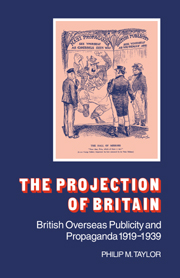Book contents
- Frontmatter
- Contents
- Preface
- Acknowledgements
- Abbreviations
- Introduction
- Part One Publicity and diplomacy, 1919–1939
- Part Two The projection of Britain, 1919–1939
- 3 Commercial propaganda and the concept of national projection
- 4 Cultural propaganda and the British Council
- Part Three Psychological rearmament, 1935–1939
- Conclusion
- Notes
- Select bibliography
- Index
4 - Cultural propaganda and the British Council
Published online by Cambridge University Press: 01 October 2009
- Frontmatter
- Contents
- Preface
- Acknowledgements
- Abbreviations
- Introduction
- Part One Publicity and diplomacy, 1919–1939
- Part Two The projection of Britain, 1919–1939
- 3 Commercial propaganda and the concept of national projection
- 4 Cultural propaganda and the British Council
- Part Three Psychological rearmament, 1935–1939
- Conclusion
- Notes
- Select bibliography
- Index
Summary
Prior to the establishment of the British Council under the auspices of the Foreign Office in 1934, British overseas propaganda was characterised largely by its strict adherence to news and factual comment. Ever since the close of the First World War, the Foreign Office News Department, as the main nerve-centre of official peacetime propaganda abroad, had worked on the assumption that the rapid and continuous dissemination of reliable information and sensible comment would provide some form of antidote to the aggressive foreign propaganda being directed against British interests and prestige. In view of the shortage of funds, it could do little else. By the early 1930s, however, the somewhat limited nature of this response was becoming increasingly apparent in influential circles beyond the Foreign Office and the DOT. It was essentially short term and political in approach, while being primarily counter-propagandist in effect. But anti-British propaganda had for some time been assuming various non-political disguises. In the economic sphere, the Empire Marketing Board and the Travel Association had begun, albeit on a small scale, to combat the detrimental effects of foreign trade propaganda upon Britain's commercial interests. Yet propaganda remained merely one of their many self-appointed tasks. Moreover, with the growing appreciation that commercial and political advertisement was largely dependent for its success upon supplementary techniques of persuasion, there developed an increasing demand for a more constructive long-term approach to the problem of foreign cultural propaganda. It was in this respect that the British Council was to provide the most imaginative response to that concept which Stephen Tallents had labelled ‘the projection of England’.
- Type
- Chapter
- Information
- The Projection of BritainBritish Overseas Publicity and Propaganda 1919–1939, pp. 125 - 178Publisher: Cambridge University PressPrint publication year: 1981
- 1
- Cited by



